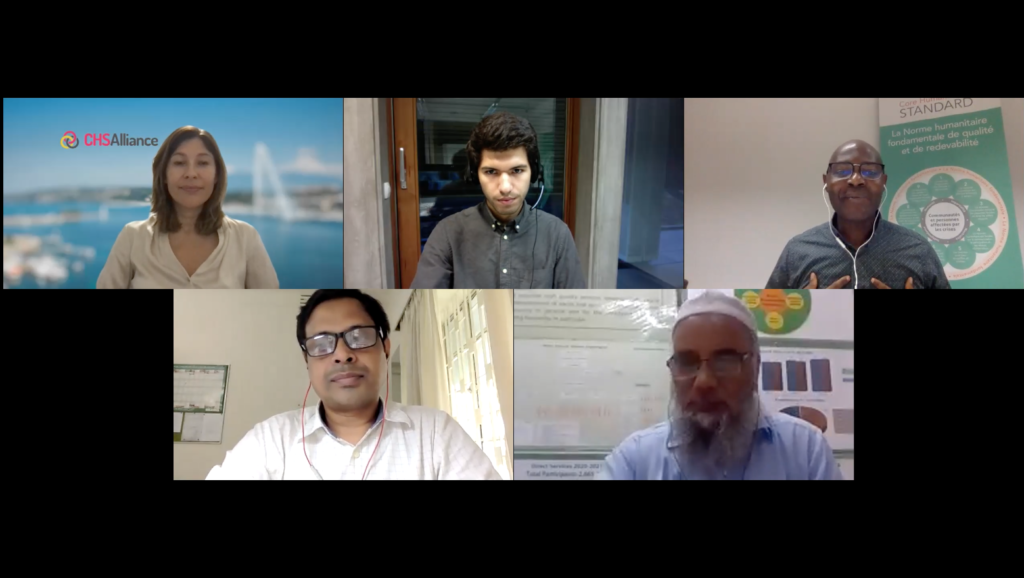A year of bringing the CHS Closer to the people we serve
Over the course of 2021, Bonaventure Sokpoh, CHS Alliance Senior Advisor on CHS and Outreach, partnered with our national members to co-organise a series of eight online workshops convening national organisations in Pakistan, Zimbabwe, Nigeria, Turkey, Bangladesh, India, the occupied Palestinian territory, and Ethiopia. More than 400 participants joined these dialogues designed to listen to local NGO’s experiences of applying the CHS in their communities, with more than 230 organisations represented.
With great thanks and appreciation to our members who made each of these workshops possible:
- Pakistan – Community World Service Asia
- Zimbabwe – Centre for Humanitarian Analytics
- Nigeria – Ohaha Family Foundation
- Turkey – Mavi Kalem
- Bangladesh – COAST Foundation
- India – All India Disaster Mitigation Institute
- occupied Palestine territory – Humanitarian Academy for Development and Islamic Relief (UK)
- Ethiopia – SOS Sahel Ethiopia
As a global network, the CHS Alliance knows the power of the CHS lies in its universality – it is a measurable, common Standard that applies to the biggest INGOs and the smallest local groups. Yet at the same time, it provides a framework that can be contextualised. For the CHS to have real impact, it must be widely implemented by national, local, and international organisations alike. We know from our members’ experience in applying the Standard, one size does not fit all, and that a better understanding and supporting locally led organisations is the solution. This is why we’ve put strong efforts into listening and hearing our national members and their peers’ perspectives on how we can better bring the CHS closer to the people we serve.

Participants at the Bangladesh workshop on the CHS.
As Ehsanur Rahman, from the National Alliance of Humanitarian Actors, stated it in the Bangladesh Workshop, “Who can do their best is the local organisation who knows the context.” This programme of workshops provided a platform in which our national members who have taken part in a form of CHS verification shared their experiences and discussed openly how the CHS Alliance can do more to support locally led organisations to make the most of the CHS. Here’s what we learned:
Seeing clearly
Across all the workshops, organisations consistently reported CHS verification as a useful learning exercise. “I thought if we went through a CHS self-assessment then we would then be able to see clearly where we stood [and so better provide for those we work with]”, Abraham Ayieko, Director of Caritas HomaBay Kenya, shared the reason behind undergoing self-assessment in the Nigeria Workshop.
Creating focus
Another topic raised repeatedly was the tangible support CHS verification provided in streamlining operations, heightening staff awareness of their rights and duties, and helping to steer focus in the right direction. Abdullah Al Kaff of Building Foundation for Development, Yemen expressed his appreciation in joining CHS Alliance during the Turkey workshop as “by applying the CHS we’re seeing those we serve are becoming happier with our work“ and also the “speed to respond and provide advice and support when needed.”
“Through using the CHS, we have really improved in terms of our programming, and we have managed to have impact among the communities where we have implemented our projects”, shared Paul Moyo of ACT Alliance in the Zimbabwe workshop.
Donor support
A key benefit of CHS verification and Alliance membership enthusiastically shared at the workshops was its appeal to donors and donor funding. Nadia Idris, M&E Coordinator at Women Empowerment Action (WE-Action) said in the Ethiopia workshop that “when donors find out we’re a CHS Alliance member it’s just very enlightening for them…and it’s very easy for them to work with us because we’re familiar with the standards as well.” Rehema Kajungu, Deputy Country Director at TPO Uganda, shared a concrete example during the Nigeria workshop involving a 20-million-dollar grant as a direct recipient from USAID– “We thought that was a great achievement, and we owe that to the verification exercise we are going through.”

A presentation at the Ethiopia workshop on the CHS.
Barriers to overcome
Based on the discussions with workshop participants, the team at the Alliance heard more about the practical barriers national and local organisations can face when trying to utilise the benefits of CHS verification. These included:
- Resource and cost barriers for organisations. We are now actively working to see how we can reduce barriers based on cost. The new CHS self-assessment tools and the Subsidy fund for Independent Verification and Certification are two ways organisations can alleviate these costs.
- Language barriers for locally led organisations. We are constantly working to overcoming this challenge by publishing the CHS and supporting materials available in more languages. So far, we have translated the CHS into 27 languages, available on the CHS website. We encourage our members and supporters to work with us to translate the CHS and guidance documents into even more languages to help make the Scheme more widely accessible around the world. The CHS self-assessment surveys can also be provided for members in additional languages where needed.
- Low awareness of the CHS. To build awareness and understanding of the CHS and the Verification Scheme we will continue engaging with our members operating in different regions of the world through our series of workshops. Look out for more in 2022 and get in touch if you’d like us to run a session in your country.
To support any of these initiatives or to feedback on our work in this area, please get in touch with Bona.
The sector will not be able to meet the CHS Commitments to people affected by crisis without the CHS being widely owned, applied and supported by local and national actors. Whether you are a small NGO, or a large INGO, the CHS is for you.
Learn more about the CHS verification options.
